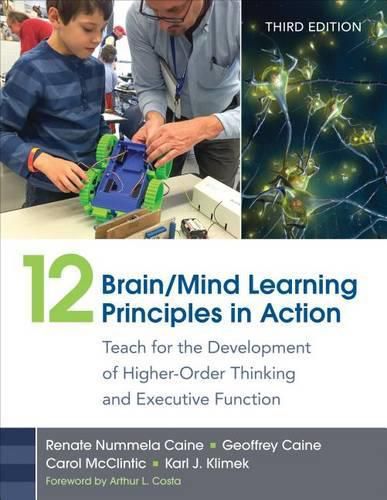Readings Newsletter
Become a Readings Member to make your shopping experience even easier.
Sign in or sign up for free!
You’re not far away from qualifying for FREE standard shipping within Australia
You’ve qualified for FREE standard shipping within Australia
The cart is loading…






Raise the bar with the best of what is known about how the brain/mind learns
Higher-order skills such as critical thinking, planning, decision-making and persistence are the key to success for today’s students. With its novel approach to teaching and learning, 12 Brain/Mind Learning Principles in Action has been the go-to resource for thousands of teachers in leading their students to greater confidence and achievement.
Now in an expanded third edition, Caine et al. offer three practical approaches to instruction-direct, problem or project-based learning, and the guided experience approach-while providing common-sense strategies to turn theory into effective classroom teaching. Features of the new edition include
More strategies to deeply engage students and build foundational learning skills Guidance on peer-based professional development through Process Learning Circles Reflective questions and checklists for assessing progress
Updated, real-life examples that illustrate brain-compatible learning in action
Bridge research to practice through these innovative strategies to create a school environment where students and faculty learn and thrive.
12 Brain/Mind Learning Principles in Action is a treasure trove of thoughtful, heartfelt, and effective ideas that will empower brains to grow, minds to expand, and classrooms to thrive. In our present system good teaching is often a subversive act - use this as a manual for guerilla warfare.
Louis Cozolino, Professor of Psychology
Pepperdine University
This book provides compelling evidence that the traditional paradigm of education, which emphasizes factual learning, is profoundly narrow and limiting. The volume, depth, and relevance of research the authors bring to the fore about effective and lasting models of teaching, learning, and leadership is impressive. May its brilliant and enlightening message once and for all replace the limited and limiting habits of mind that have legitimated educational policy and practice for centuries in the Western World.
William Spady, Director
The 5th Paradigm
$9.00 standard shipping within Australia
FREE standard shipping within Australia for orders over $100.00
Express & International shipping calculated at checkout
Raise the bar with the best of what is known about how the brain/mind learns
Higher-order skills such as critical thinking, planning, decision-making and persistence are the key to success for today’s students. With its novel approach to teaching and learning, 12 Brain/Mind Learning Principles in Action has been the go-to resource for thousands of teachers in leading their students to greater confidence and achievement.
Now in an expanded third edition, Caine et al. offer three practical approaches to instruction-direct, problem or project-based learning, and the guided experience approach-while providing common-sense strategies to turn theory into effective classroom teaching. Features of the new edition include
More strategies to deeply engage students and build foundational learning skills Guidance on peer-based professional development through Process Learning Circles Reflective questions and checklists for assessing progress
Updated, real-life examples that illustrate brain-compatible learning in action
Bridge research to practice through these innovative strategies to create a school environment where students and faculty learn and thrive.
12 Brain/Mind Learning Principles in Action is a treasure trove of thoughtful, heartfelt, and effective ideas that will empower brains to grow, minds to expand, and classrooms to thrive. In our present system good teaching is often a subversive act - use this as a manual for guerilla warfare.
Louis Cozolino, Professor of Psychology
Pepperdine University
This book provides compelling evidence that the traditional paradigm of education, which emphasizes factual learning, is profoundly narrow and limiting. The volume, depth, and relevance of research the authors bring to the fore about effective and lasting models of teaching, learning, and leadership is impressive. May its brilliant and enlightening message once and for all replace the limited and limiting habits of mind that have legitimated educational policy and practice for centuries in the Western World.
William Spady, Director
The 5th Paradigm